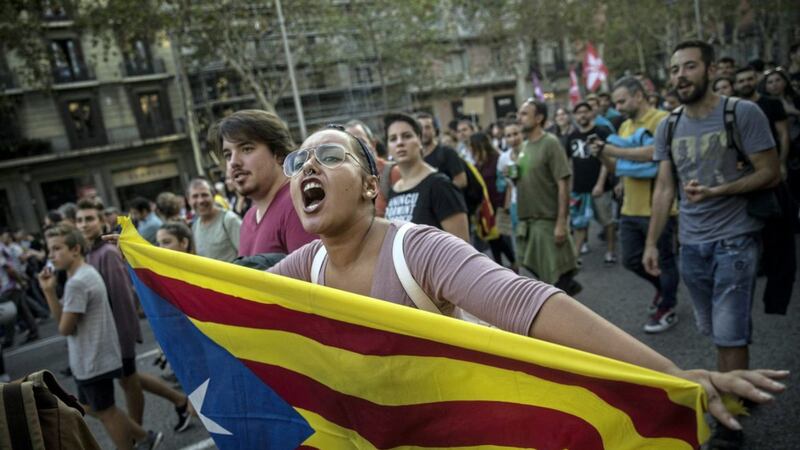Long, long before the Spanish government’s ‘storm-troopers’ arrived on the streets, the Spanish government had lost, emotionally and politically, the vast majority of the people of Catalunya.
They were lost in the historical mist of time, stretching back for 300 years, where an oppressed memory nurtured and shaped a sense of nationhood.
Out of this mist emerged the millions of people we have seen on the streets of Barcelona over the last few years peacefully expressing this sense of nationhood.
Out of this mist over two million people braved the batons, lethal rubber bullets and brutality of the Spanish police to vote for independence a few weeks ago.
In doing so they put a shape on the mist of history with its potent and colourful mix of culture, language, politics and identity.
On our television screens, the world is witnessing the birth pangs of a new nation called Catalunya. A nation which has existed metaphorically and distinctively in the minds of its people for three centuries.
The violence of the Spanish police not only stirred the millions of Catalans to vote and march it reawakened old memories of a time when the power of the Spanish state was absolute and brutal. A time when the name Franco struck fear in the people of Spain and Catalunya.
An 83-year-old man standing quietly in a queue outside a school polling station with a ballot paper in his hand was batoned by the police to the ground. Hospitalised, he clung to his ballot paper and returned to the school, to queue, to wait, to vote. And did.
He grew up in Franco’s dictatorship and survived it. His vote was opening a new chapter in Catalunya’s nation-building story.
A 22-year-old woman, also hospitalised by a police baton, with a bandage over her eye, never felt the fear induced by Franco but felt the violence of a state for daring to vote for independence.
Separated by sixty years of life both carried the wounds of an old and new hurt. And old hurt still raw – a new hurt still to find its historical place in memory and folk-lore.
Both united with millions of others, in a shared experience, in an unstoppable and uncontainable, tide of emotion and belief that the nation and independence are a heart-beat away.
The desire for independence for Catalunya has found a new, more powerful, expression in the millions of people now wedded to it.
The Madrid-based Spanish government is removed from the new mood for independence yet it is the oppressive decisions it has taken over the last decade which has fuelled this mood.
It is handling the situation there as it has the situation in the Basque country where its first response to democratic demands for democracy was to use state coercion and violence.
It does not matter to the people of Catalunya and the Basque country how often the Spanish courts and government say their actions are illegal.
It does not matter how many people (or their place in society) are arrested and imprisoned for peacefully campaigning for independence.
The court rooms and the prisons are the very places where independence movements grow in strength.
We have a long, long experience of the role of court rooms and prisons in our struggle for Irish independence.
Courtrooms and prisons are the same the world over. They are the last place you will find a solution to the issue of independence.
No two situations are the same but comparisons can be made.
The situation in Catalunya is reminiscent of the period in 1918 when the people of Ireland overwhelmingly voted for Sinn Féin and independence.
The democratic decision, rejected by the British government, ushered in a separatist plan to remove all vestiges of English rule in Ireland.
The minds of the majority of the Irish people were settled on the question of independence: a minority, the unionists, were opposed.
There are lessons from Irish history on how to respond to the democratic will of the people.
The first is to respect the will of the people. The demands for independence in the Basque country and in Catalunya are as legitimate as the demand here for a border poll on Irish unity.
Let the people decide their future.








